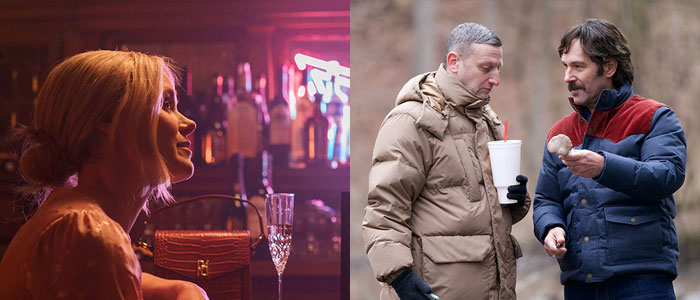YOUNG WERTHER
*/****
starring Douglas Booth, Alison Pill, Iris Apatow, Patrick J. Adams
screenplay by José Lourenço, based on the novel The Sorrows of Young Werther by Johann Wolfgang Goethe
directed by José Lourenço
FRIENDSHIP
**½/****
starring Tim Robinson, Paul Rudd, Kate Mara, Jack Dylan Grazer
written and directed by Andrew DeYoung
by Bill Chambers Johann Wolfgang Goethe’s 1774 semi-autobiographical novel The Sorrows of Young Werther made Goethe a global literary sensation practically overnight. José Lourenço’s Young Werther dares to poke a hole in the fourth wall by splashing this factoid across the screen in introductory text, comparing the book’s impact to that of Beatlemania. It’s certainly a choice, explaining the success of The Sorrows of Young Werther as if today’s audiences have no sense of history while simultaneously drawing an analogy to a fad from the ’60s. A more current reference would, I suppose, throw off the film’s Luddite chic. This is a modern-dress adaptation, yes, but there’s a strong whiff of Wes Anderson in how it translates the novel’s epistolary form into a fondness for the quaint and the bespoke (those opening titles are presented with filigreed borders, silent-movie style)–not to mention the picture’s formalist approach to shot design, which at least gives Young Werther more visual élan than one expects of a Crave Original. Citing the book’s fame at all, though: what’s the point? It feels like insecurity at best, overpromising at worst. Can you tell I didn’t care for Young Werther? It’s just so in love with itself that I felt like a third wheel.
Young bon vivant Werther (Douglas Booth, a one-man theme park whose past roles include Romeo, Great Expectations’ Pip, Percy Shelley, Nikki Sixx, and the son of Noah) arrives in Toronto on a day trip, spots willowy blonde Charlotte (Alison Pill) from afar, and spends the evening doing a pretty good job of wooing her. (You get a nice, juicy wink at the book’s origins when he requests a waltz at a dance club.) At the end of their brief encounter, Charlotte reveals that she is happily engaged, and lovesick Werther, because he’s an eighteenth-century creation, sees this as her not establishing boundaries but throwing down the gauntlet. He lingers in Charlotte’s orbit and discovers, as we discover, that her fiancé, Albert (Patrick J. Adams), is actually a decent man with a lot going for him. (He’s a crusading lawyer.) If he–Werther, that is–has an ace up his sleeve, it’s that Albert is kind of taciturn while Charlotte herself has had little opportunity to let her hair down, having been responsible for her younger sister, Sissy (Iris Apatow), since their mother passed away, making her–Charlotte, that is–susceptible to the whole Manic Pixie Dreamboy experience Werther represents.
He is a wake-up call for both Charlotte and Albert, who realize they aren’t having any fun together, but Werther’s unrequited love isn’t the unbearable torture it is in the book, where it leads to a suicide that has influenced more than a few hopeless romantics to take their own lives over the centuries (like Beatlemania!)–just as Werther’s sartorial style inspired an early form of cosplay. When Steve Martin changed the ending of Cyrano de Bergerac for his Roxanne, he had rebuilt the material into a romantic comedy in which his physically disadvantaged hero getting the girl was the organic outcome. Young Werther changes the ending because, on screen, Werther is too much the arch hipster to support a tragic fate–which might be a cannier critique of the book than I’m ready to admit. Pill has received some of the best reviews of her career as the winsome Charlotte, but it’s a blessing and a curse that the character’s chapter-skipped youth resonates with how Pill went straight from playing students to teachers in the popular imagination because no one in the past 20 years had the insight to make her the romantic lead. She’s in her element here, but she’s undoubtedly a bit long in the tooth for Charlotte, and styled so rigidly it’s as though one hair out of place will cause the decades to instantly catch up with her. It reduces her to a cartoon character, and one of those is already enough for Young Werther.
I can’t say I’m surprised that A24 picked up Andrew DeYoung’s Friendship for distribution at the end of TIFF–it’s the A24 version of those Judd Apatow buddy comedies from a few years back, i.e., elevated bromance. “I Think You Should Leave”‘s Tim Robinson stars as self-described lone wolf Craig Waterman, a suburban husband and father whose wife (Kate Mara) and teenage son (Jack Dylan Grazer) mostly mystify him. One day, he delivers a package mistakenly left on his doorstep to new neighbour Austin (Paul Rudd, the casting of whom may have been all but constitutionally mandated by the genre), a TV weatherman whose name seems to represent the same bohemian oasis as Austin, TX. Retro-cool Austin takes a shine to Craig, and Craig’s defenses evaporate almost immediately. A friendship blossoms as Austin challenges Craig to leave his comfort zone, to eat wild mushrooms and explore their neighbourhood’s catacombs, but Craig spoils it by going the full Tim Robinson, natch, and he spends the rest of the movie ruining the lives of everyone around him trying to recapture the exhilaration of hanging out with Austin.
Shot in dark and dated suburban homes, catalogue-furnished caves illuminated by the firelight of table lamps, Friendship’s blend of grim atmospherics and outrageous behaviour comes far closer to capturing the tone of Thomas Berger’s satirical novel Neighbors than the psychologically neutered official adaptation did. Robinson is at home here, having frequently wandered into the territory of psychodrama on “I Think You Should Leave”, although his presence perhaps exacerbates an episodic narrative, as we catch ourselves ranking the individual scenes according to their success as sketches. (On that score, the hysterically funny drug trip near the end of the film rises to the very top.) And while Robinson is exactly the right actor to play the peculiarly modern specimen that is Craig–a mediocre white man chafing against the shackles of his limited imagination–his performing style sucks up so much oxygen it’s ultimately fatiguing, proving the wisdom of “I Think You Should Leave” episodes tapping out after 15 minutes. I look forward to Robinson finding a Paul Thomas Anderson who can fine-tune this neo-Don Knotts instrument of chaos à la Adam Sandler and Punch-Drunk Love. I also look forward to Rudd ditching the comedy crutches (pornstar mustaches and other eccentricities) and striving for something human again. Programme – Young Werther: Special Presentations; Friendship: Midnight Madness



